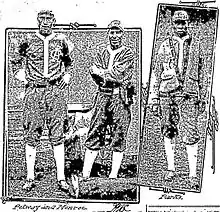Bruce Petway
Bruce Franklin Petway (born Nashville, Tennessee on December 23, 1885 - died Chicago, Illinois on July 4, 1941)[5] was a Negro league catcher in the early 20th century who came to be known as having one of the best throwing arms in the league. He is also said to have been one of the first to have consistently thrown to second base without coming out of the squat.
| Bruce Franklin "Home Run" Petway | |||
|---|---|---|---|
 | |||
| Catcher | |||
| Born: December 23, 1885 Nashville, Tennessee | |||
| Died: July 4, 1941 (aged 55) Chicago, Illinois | |||
| |||
| debut | |||
| 1906, for the Cuban X-Giants | |||
| Last appearance | |||
| 1925, for the Detroit Stars | |||
| Teams | |||
Baseball writers Harry Daniels and Jimmy Smith both put Petway on their 1909 "All-American Team" saying as a catcher he was "the greatest since Arthur Thomas's time."[6]
Petway left a career in medicine to pursue baseball, playing for a number of Negro league teams, most notably the Leland Giants (1906, 1910), Philadelphia Giants (1907–1909), Chicago American Giants (1911–1918), and the Detroit Stars (1919–1925).
While playing in Cuba in 1910, he reportedly threw Ty Cobb out three times, in three attempts to steal. That year, he batted .390, showing off his hitting skills as well. He also led the Cuban League in stolen bases in 1912, when he picked up 20, a rarity for a catcher even at the time.
Chicago American Giants

Petway traveled with the 1913 Chicago American Giants when they toured the United States. He remained with the team until he moved to the Detroit Stars in 1919.
He played with the Stars into the 1920s when he continued to post solid numbers, while simultaneously managing the team, as many stars did in that day. With Detroit, he played with such greats as Pete Hill and future New York Black Yankees' star Bill Holland.
Eleven years after his death, Petway received votes listing him on the 1952 Pittsburgh Courier player-voted poll of the Negro leagues' best players ever.[7]
References
- "Frank Lelands' Chicago Giants Base Ball Club" Fraternal Printing Company, 1910
- "Augusta Beaten" The Daily Kennebec Journal, Kennebec, ME, Page 4, Column 7
- "All Nations Tackle the American Giants" Chicago Defender, Big Weekend Edition, Chicago, IL, October 7, 1916, Page 7
- "Hilldale Team Wins" Philadelphia Inquirer, Philadelphia, PA, August 6, 1919, Page 12
- The ESPN Baseball Encyclopedia. Sterling Publishing. 2007. p. 1699. ISBN 1-4027-4771-3.
- "The Base Ball Spirit In The East." Indianapolis Freeman, Indianapolis, Indiana, Saturday, December 25, 1909, Page 7, Columns 1 and 2
- "1952 Pittsburgh Courier Poll of Greatest Black Players"
External links
- Negro league and Cuban League statistics and player information from Seamheads.com, or Baseball-Reference (Negro leagues)
